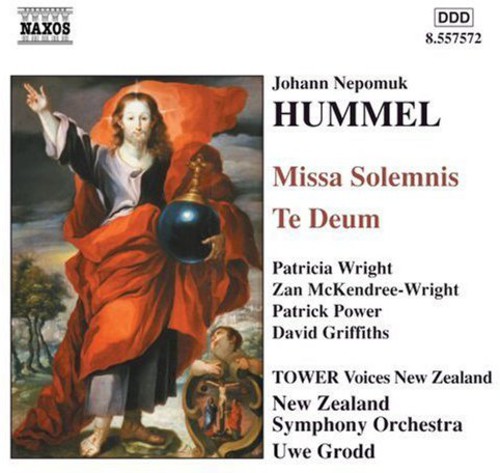Show results for
Deals
- 4K Ultra HD Sale
- Action Sale
- Alternative Rock Sale
- Anime sale
- Award Winners Sale
- Bear Family Sale
- Blu ray Sale
- Blues on Sale
- British Sale
- Classical Music Sale
- Comedy Music Sale
- Comedy Sale
- Country Sale
- Criterion Sale
- Electronic Music sale
- Fantasy Film and TV
- Folk Music Sale
- Hard Rock and Metal Sale
- Horror Sci fi Sale
- Jazz Sale
- Kids and Family Music sale
- Kids and Family Sale
- Metal Sale
- Music Video Sale
- Musicals on Sale
- Mystery Sale
- Naxos Label Sale
- Olive Films on Sale
- Page to Screen Sale
- Paramount Sale
- Pop and Power Pop
- Rap and Hip Hop Sale
- Reggae Sale
- Rock and Pop Sale
- Rock Legends
- Soul Music Sale
- TV Sale
- TV Sale
- Vinyl on Sale
- War Films and Westerns on Sale

Missa Solemnis in C Major / Te Deum
- Format: CD
- Release Date: 6/15/2004

Missa Solemnis in C Major / Te Deum
- Format: CD
- Release Date: 6/15/2004
- Conductors: Uwe Grodd
- Orchestras: New Zealand Symphony Orchestra
- Performers: David Griffiths, Donald Armstrong, Patricia Wright, Patrick Power, Zan McKendree-Wright
- Label: Naxos
- UPC: 747313257225
- Item #: NXIN325722
- Genre: Classical
- Release Date: 6/15/2004
Product Notes
The Missa Solemnis is a worthy successor to the late Haydn Masses. It's brilliant orchestration, inventive and flexible choral writing and technical resourcefulness are the work of an experienced and gifted composer. While the work obviously owes much to the example of the late Haydn Masses it is no pale, bloodless imitation. The Kyrie is a deeply satisfying movement. The Grave opening is at once highly dramatic and yet firmly rooted in the long and distinguished Viennese tradition of C major festive Masses. In contrast, the quiet opening of the succeeding Allegro moderato, scored for winds alone, is an astonishingly modern touch. The choral writing is lyrical but not without it's moments of drama; the accompaniment, which benefits enormously from Hummel's brilliant handling of his orchestral forces, infuses the Kyrie with tremendous drive and verve. The Te Deum is an immensely attractive work. The orchestration blazes with bright primary colors and the choral writing is fluid and attractive. Although relatively short in duration, the Te Deum contains moments of great emotional gravity as well as pure transcendent joy. If indeed Hummel did compose the work to celebrate the Peace of Pressburg, one might argue that the Alliance's defeat at Austerlitz received a far greater musical memorial than did Wellington's victory at the Battle of Vittoria a few years later.


